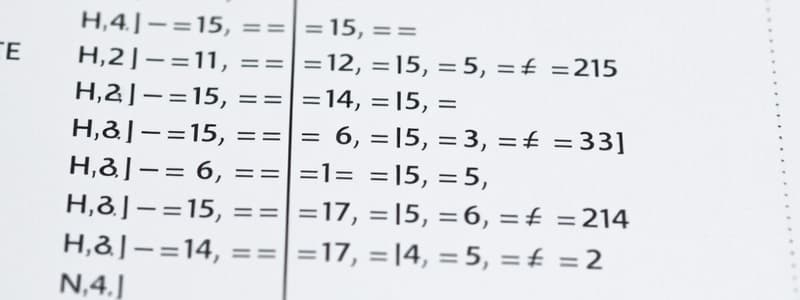Podcast
Questions and Answers
What is a variable?
What is a variable?
- A constant
- Any factor or property that a researcher measures, controls, and/or manipulates (correct)
- A type of data analysis
- None of the above
What are the classifications of variables?
What are the classifications of variables?
Numeric, Categorical, Experimental, Non-Experimental and Variables according to the number being studied.
What are numeric variables?
What are numeric variables?
Variables with values that describe a measurable numerical quantity.
Which of the following are types of numerical variables?
Which of the following are types of numerical variables?
What are continuous variables?
What are continuous variables?
Give examples of continuous variables.
Give examples of continuous variables.
What are discrete variables?
What are discrete variables?
What are categorical variables?
What are categorical variables?
Which of the following are types of categorical variables?
Which of the following are types of categorical variables?
What are ordinal variables?
What are ordinal variables?
What are nominal variables?
What are nominal variables?
What are dichotomous variables?
What are dichotomous variables?
What are polychotomous variables?
What are polychotomous variables?
What are experimental variables?
What are experimental variables?
What are independent variables?
What are independent variables?
What are dependent variables?
What are dependent variables?
What are extraneous variables?
What are extraneous variables?
What are non-experimental variables?
What are non-experimental variables?
What is an example of a non-experimental variable?
What is an example of a non-experimental variable?
What are the types of studies based on the number of variables?
What are the types of studies based on the number of variables?
What is a univariate study?
What is a univariate study?
What is a bivariate study?
What is a bivariate study?
What is a polyvariate study?
What is a polyvariate study?
Flashcards are hidden until you start studying
Study Notes
Classification of Variables
- Variables are factors or properties measured, controlled, or manipulated by researchers.
- Types of variable classifications include: Numeric, Categorical, Experimental, Non-Experimental, and based on the number of variables studied.
Numeric Variables
- Numeric variables represent measurable numerical quantities, answering "how many" or "how much."
- Comprised of Continuous and Discrete variables.
Continuous Variables
- Can take any value within a specified range of real numbers, also referred to as Interval Variables.
- Examples include time, age, temperature, height, and weight.
Discrete Variables
- Only take whole values within the defined limits.
- Examples include the number of registered cars, business locations, children in a family, student population, and faculty numbers.
Categorical Variables
- Describe qualities or characteristics and answer questions like "what type" or which category.
- Further divided into Ordinal, Nominal, Dichotomous, and Polychotomous variables.
Ordinal Variables
- Can be logically ordered or ranked.
- Examples include academic grades, clothing sizes, and attitude measures like "strongly agree."
Nominal Variables
- Values cannot be logically sequenced.
- Examples encompass business types, eye colors, religions, and types of learners.
Dichotomous Variables
- Represent only two categories.
- Examples are male/female, yes/no, and true/false.
Polychotomous Variables
- Have multiple categories.
- Examples include educational attainment and levels of performance.
Experimental Variables
- Include Independent, Dependent, and Extraneous variables.
Independent Variables
- Typically manipulated in experiments, also known as explanatory variables.
Dependent Variables
- Affected by the manipulation of independent variables, also referred to as response or predicted variables.
Extraneous Variables
- Also called mediating or intervening variables; can affect the relationship between independent and dependent variables.
Non-Experimental Variables
- Include Predictor and Criterion variables.
Predictor Variables
- Change one or more other variables in non-experimental studies.
Criterion Variables
- Influenced by predictor variables.
Study Types by Number of Variables
- Univariate study: focuses on one variable.
- Bivariate study: examines two variables.
- Polyvariate study: investigates more than two variables.
Studying That Suits You
Use AI to generate personalized quizzes and flashcards to suit your learning preferences.



